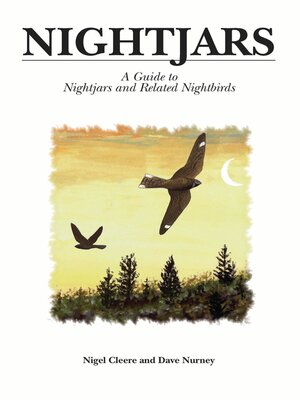Nightjars
ebook ∣ A Guide to Nightjars and related birds · Helm Identification Guides
By Nigel Cleere

Sign up to save your library
With an OverDrive account, you can save your favorite libraries for at-a-glance information about availability. Find out more about OverDrive accounts.
Find this title in Libby, the library reading app by OverDrive.



Search for a digital library with this title
Title found at these libraries:
| Library Name | Distance |
|---|---|
| Loading... |
Field guide to nightjars and related bird species, including frogmouths, potoos, owlet-nightjars and the oilbird.
The nightjars and their allies are amongst the most difficult of all birds to identify. Being strictly nocturnal and cryptically patterned in shades of brown, it is often necessary to rely on size, shape, habitat and voice to safely identify a species.
The nightjars are by far the largest family in the order and are spread throughout the world. Some species have developed spectacular tails and wing adornments, but the majority are fairly uniform in appearance. They inhabit both forests and deserts and are ground-nesting. Many species are migratory. The forest-dwelling frogmouths of Asia and Australasia and the potoos of Latin America, adopt a less aeiral feeding strategy and nest on open branches or in tree crevices. The unique oilbird of South American nests colonially in caves, and the owlet-nighjars almost exclusively inhabit Australasia.
Featuring thoroughly researched text, both through museums and in the field, this book fully covers this popular group of birds. The illustrations depict feather-by-feather detail, allowing identification of all species of nightjars, and an accompanying CD aids identification through the spectacular voices of many species.
The nightjars and their allies are amongst the most difficult of all birds to identify. Being strictly nocturnal and cryptically patterned in shades of brown, it is often necessary to rely on size, shape, habitat and voice to safely identify a species.
The nightjars are by far the largest family in the order and are spread throughout the world. Some species have developed spectacular tails and wing adornments, but the majority are fairly uniform in appearance. They inhabit both forests and deserts and are ground-nesting. Many species are migratory. The forest-dwelling frogmouths of Asia and Australasia and the potoos of Latin America, adopt a less aeiral feeding strategy and nest on open branches or in tree crevices. The unique oilbird of South American nests colonially in caves, and the owlet-nighjars almost exclusively inhabit Australasia.
Featuring thoroughly researched text, both through museums and in the field, this book fully covers this popular group of birds. The illustrations depict feather-by-feather detail, allowing identification of all species of nightjars, and an accompanying CD aids identification through the spectacular voices of many species.







